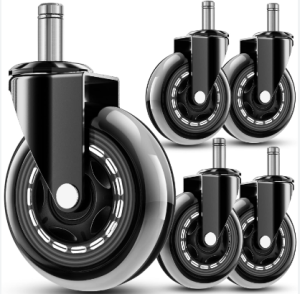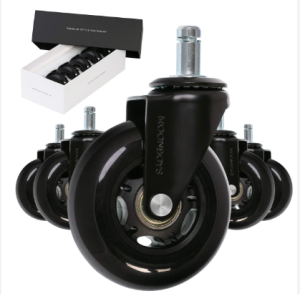Office Chair Wheels
In the modern age of rapidly evolving workspaces and the increasing prominence of remote work, the significance of a comfortable and ergonomic office environment cannot be overstated. Among the essential components that contribute to such an environment, office chair wheels hold a noteworthy place. These inconspicuous yet vital elements play a crucial role in enhancing both comfort and efficiency, allowing seamless mobility within the workspace. In this exploration, we delve into the world of office chair wheels, unveiling the best options available and the factors that make them stand out.
The Role of Office Chair Wheels
Office chair wheels, often referred to as casters, are the unsung heroes of any office space. They enable the fluid movement of office chairs, permitting users to glide effortlessly between various workstations, reach for documents without strain, and maintain dynamic posture adjustments. These wheels facilitate quick and convenient movement, which can significantly impact productivity and comfort throughout the workday.
Key Considerations in Choosing the Best Office Chair Wheels
Floor Compatibility: One of the foremost considerations when selecting office chair wheels is the type of flooring in your workspace. Different wheels are designed for different surfaces, including hardwood, carpet, tile, and laminate. It is imperative to choose wheels that are suitable for your specific floor type to ensure smooth and scratch-free movement.

Wheel Material: The material of the wheel itself plays a crucial role in determining its durability, noise level, and overall performance. Common wheel materials include rubber, polyurethane, and nylon. Rubber wheels offer excellent traction and are gentle on floors, while polyurethane wheels are known for their durability and quiet movement. Nylon wheels are sturdy and ideal for heavier chairs.
Wheel Size: The size of the wheel affects how well it navigates various surfaces. Larger wheels tend to roll more smoothly over uneven terrain, while smaller wheels are better suited for compact workspaces. Striking the right balance between size and maneuverability is essential.
Weight Capacity: The weight capacity of the chair wheels should align with the weight of the user and the chair itself. Overloading the wheels can lead to premature wear and reduced functionality. It’s advisable to choose wheels with a capacity that comfortably exceeds the maximum load they will bear.
Braking Mechanism: Many modern office chair wheels are equipped with braking mechanisms, allowing users to lock the wheels in place when needed. This feature can prevent unintended movement and enhance safety, especially on inclined surfaces.
Swivel Capability: The ability of the wheels to swivel smoothly is vital for seamless movement. High-quality swivel mechanisms ensure that users can change direction effortlessly, without strain.

Installation: The installation process should be straightforward and compatible with your existing chair. Most office chair wheels are designed to be easy to install, requiring minimal tools and effort.
Exploring the Best Office Chair Wheels
Rollerblade Style Wheels: Inspired by rollerblade wheels, these office chair casters offer exceptional smoothness and maneuverability. They are often made of polyurethane, ensuring durability and quiet operation. Rollerblade-style wheels are suitable for various floor types and are known for their versatility.
Rubber Wheels: Rubber office chair wheels are gentle on floors and provide excellent traction. They are ideal for hardwood and tile surfaces, preventing scratches while delivering smooth movement. These wheels are often chosen for their combination of functionality and floor protection.
Polyurethane Wheels: Known for their durability and quiet operation, polyurethane wheels are a popular choice for office chairs. They can handle both hardwood and carpeted floors with ease, making them a versatile option for various workspaces.
Heavy-Duty Nylon Wheels: For chairs that bear a substantial weight, heavy-duty nylon wheels are an excellent choice. These wheels are built to withstand pressure and are often used in executive office chairs or chairs with heavier frames.
Brake-Enabled Wheels: Office chair wheels with built-in brakes provide an additional layer of convenience and safety. The braking mechanism prevents unintended movement, making them ideal for situations where stability is crucial.
Conclusion
In the pursuit of an ideal office environment, attention to even the smallest details can make a significant difference. Office chair wheels, often overlooked, play an indispensable role in ensuring comfort, efficiency, and productivity in the workspace. The best office chair wheels are those that align with your specific needs, taking into account factors such as floor type, wheel material, size, weight capacity, braking mechanism, swivel capability, and ease of installation. By investing in high-quality chair wheels, you pave the way for a smoother, more comfortable, and productive work experience, ultimately enhancing your overall well-being in the office
FAQs about Best Office Chair Wheels
What are office chair wheels, and why do they matter?
Office chair wheels, also known as casters, are the small rotating mechanisms attached to the base of office chairs. They allow the chair to move smoothly and easily across various surfaces. Choosing the right office chair wheels is important to ensure comfortable and efficient movement, prevent damage to flooring, and enhance overall productivity.
How do I know if I need to replace my office chair wheels?
You might need to replace your office chair wheels if they are damaged, worn out, or causing difficulties in movement. Signs to look for include uneven rolling, squeaking, scratching or damaging your floor, or if the wheels are visibly cracked or broken. Upgrading to higher-quality wheels can also improve chair stability and comfort.
What factors should I consider when selecting the best office chair wheels?
Several factors influence the choice of office chair wheels:
Flooring Type: Consider whether your office has hardwood, carpet, tile, or a combination of flooring types. Choose wheels designed for your specific floor to prevent damage.
Wheel Material: Common materials include rubber, polyurethane, and nylon. Each offers different levels of durability, noise reduction, and smoothness of movement.
Wheel Size: Larger wheels generally work better on carpets, while smaller wheels are suitable for hard surfaces. Optimal wheel size depends on your flooring type.
Weight Capacity: Ensure the wheels can support your body weight and the weight of the chair itself.
Braking Mechanism: Some wheels come with a locking or braking feature to prevent unwanted movement when necessary.
Are there office chair wheels that work well on all types of flooring?
While there are versatile wheels designed for multiple flooring types, it’s recommended to choose wheels optimized for the specific flooring in your office. Rubber or polyurethane wheels are generally safe for both hard and carpeted surfaces, as they provide a good balance of grip and smooth movement without causing damage.
How can I install or replace office chair wheels?
Replacing office chair wheels is usually a straightforward process:
Flip the chair onto its side, exposing the existing wheels.
Gently pull or pry the old wheels out of their sockets. Some might require a bit of force.
Insert the new wheels by pushing them firmly into the sockets until they click into place.
Test the chair’s movement to ensure the new wheels are securely attached and rolling smoothly.
Remember to consult your chair’s manufacturer or user manual for any specific instructions or considerations related to wheel replacement.
